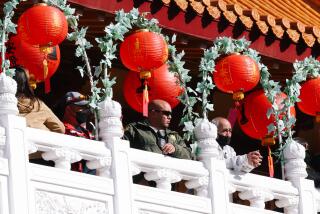MULTICULTURAL MANNERS : Sweeping In the New Year
- Share via
Janet’s grandmother is an elderly Chinese lady from Vietnam who holds on to tradition. On the eve of the Chinese New Year, all the relatives come over for dinner. The children play games and are given red envelopes with money inside by the married adults.
The next day, Janet wants to do something nice and sweeps the floor. Grandmother becomes so infuriated she ignores Janet for the whole day.
What went wrong?
What Janet didn’t know was that, according to her grandmother’s belief, wealth and good luck were swept away along with crumbs and dust. Similarly, many Chinese people do not shower on New Year’s Day for fear of washing away good luck.
This year, the Chinese Year of the Boar begins Jan. 31. Vietnamese people celebrate their new year at the same time but call it Tet. They hope to attract good luck by placing food offerings on home altars to invite spirits of deceased family members to share the holiday.
Janet’s misunderstanding is typical of problems caused by generational differences. As younger members of an immigrant family become more Americanized, they become less familiar with traditions of their elders.
Rule: Chinese people skip some cleaning routines on New Year’s Day to avoid undoing good fortune in the coming year.


